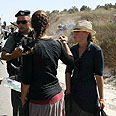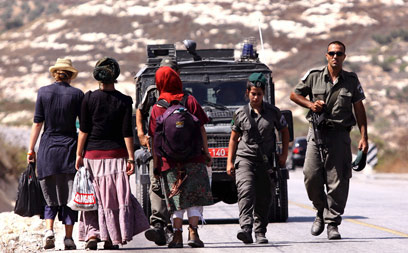
The goal: Clash with police. The means: Provocations all the way. The result: Well, clashes with police, and dozens of arrests. Or in short: Thrills to no end.
Please welcome the summer's biggest hit in the West Bank: A march from Nablus to Jericho, including courtesy visits to Arab villages and illegal outposts.
Sunday, 8 am, Shvut Ami: "Write that this outpost was evacuated more than 200 times – we counted," a short teen with long side-locks says to me. "He shouldn't write that," says his friend. "They'll know we're here and come for us again."
Police officers are already waiting as we leave Shvut Ami. What was a long line of some 100 youth only a minute ago, turns instantly into dozens of scattered groups running towards nearby hills.
"We'll meet up in Havat Gilad," they all agree.
As customary in many protest marches, celebrities join the progression as it passes through the big cities.

Hilltop Youth en-route to Jericho (Photo: Haim Zach)
And indeed, Professor Hillel Weiss, who was documented cursing the IDF's Hebron Brigade commander during a 2007 evacuation of Hebron settlers, and extreme rightist Baruch Marzel, are already waiting for the marchers at the entrance to Havat Gilad.
"It's like the Plague of Frogs," says Marzel. "Every time you try to hit it, the procession splits into more cells. Each one has the potential of turning into its own march."
Longing for Sebastia
Sunday, 3:30 pm, Havat Gilad east: As the first day of marching draws to a close, almost all participants have at least one arrest under their belt. The police drop the detainees at distant checkpoints, and they immediately catch a ride back and join their colleagues.
Meanwhile, veteran activists join the procession, including Rabbi Yosef Badichi and Member of Knesset Michael Ben Ari (National Union), who recount stories from the "good ol' days in Sebastia," when they made several attempts to build a settlement on the ruins of a Palestinian village, leading to a formal agreement with the government that paved the way to the Jewish settlement in the West Bank.
The heat wave is at its peak, and a long line forms in front of a sign reading, "All you who are thirsty, come to the waters."
The marchers' dress code isn't particularly conducive to the weather either. The girls are wearing several layers of clothing – skirts on top of pants, handkerchiefs and sleeve extensions.
The guys have a simpler attire – shirts with pictures of Rabbi Kahane, or some sort of appropriate slogan such as "I only buy from Jews."
The first crisis occurs before evening, when the organizers decide not to march to the Mitzpe Yosef outpost, for fear of clashing with police, and also in order to save some energy for likely confrontations the following day.
The group of girls decides to charge ahead and reach the outpost at all cost, but is disappointed to find not a single cop upon arrival. They reluctantly carry on to Har Bracha.
Monday, 7:15 am, a hilltop in the settlement of Eli: The youth greet us with a mysterious smile. Only after many persuasions I manage to extract the details of the previous night. At 1 am, while sleeping at Har Bracha, they received information that the police planned to arrest all of them in the early hours of the morning.
In a matter of minutes, they all leaped toward the hilltops of Eli. The police officers, they say, are still unaware of the surprise that awaits them. "There's action even here," says 18-year-old Moshe, "The sprinklers were set off in the middle of the night, and got us all soaked."
The Hilltop Youth, it is important to note, do not believe in bourgeois indulgences such as sleeping bags. "Why should I carry it around all day long? I brought a long-sleeved shirt instead," says one of the teens.
The brave ones simply sleep on the ground. "I've been strolling around the hilltops for the past two years without a sleeping bag, why start now?" explains Malchiel Bar-Hai. "There's nothing we can do about it, the Land of Israel is obtained through misery," he adds.
By morning of the second day, the number of participants has reduced by half, totaling some 50 guys and girls. "Maybe each one should phone two of his friends," one of them suggests. But to no use, as they all end up calling the same people.
Like in any self-respected summer camp, the participants each receives a pouch of milk chocolate and a bread roll, which by the likes of their surrounding is probably made of sheep's milk and challah bread.
'What whackheads'
Monday, 10 am, Carmei Shilo– Two weeks after Tu B'Av, the unmarried daughters of Israel go out to dance in the vineyards. This time, playing the role of the lecherous Bnei Israel are the Judea and Samaria District police officers, drenched in sweat.
"If you are arrested – you are a victor," declares a blonde named Miriam. Those who are not detained or arrested continue marching toward the settlement of Ofra.
One young man is wearing a t-shirt with the slogan "For by wise guidance you can wage your war" – The motto of Duvdevan, an IDF elite unit, where his older brother serves.
It seems the younger brother is the wiser after all, as his brother the soldier sneaks into Arab villages by night, while he carelessly strolls around the same villages in broad daylight.
Contrary to previous concerns, the residents of the Palestinian village of Sinjil treat the passersby with both astonishment and indifference. "What kind of Whackheads walk around in this heat?" wonders one of the Arab residents.
.
In the afternoon the procession reaches Ramat Migron – a subsidiary outpost of Migron. The participants hold a rally, and another famous persona takes the stage – this time it's Dr. Hagi Ben Artzi. "He might be Bibi's relative, but he's one of us," one of the participants boasts.
Monday, 11:20 pm, Ramat-Migron's boys section (Five minutes from Ramat-Migron's girls section): "Oh…we're returning to Jericho, Jericho, Jericho" (the unofficial anthem of the march). This, without doubt, is the highlight for Ramat-Migron, an illegal outpost with a population of two to five residents.
The five permanent inhabitants prepare dinner for everyone; nothing to write home about – only some pickles and hummus on a bed of corn. Just like in military reserve.
Suddenly, the settler version of the "IDF mobile kiosk" appears and hands out sandwiches; definitely a turn for the better, in a procession that up until now carried the theme of frugality.
Twins Malchiel and Israel Bar-Hai, for example, allocated only NIS 15 (about $4) per each day of the journey. A visit to Ofra's grocery store almost enticed them to exceed the budget, but they quickly came to their senses.
Malchiel is tormented by the fact that his wife and newborn child did not join the march. "He's only one month old," he explains with an apologetic smile, "but God willing, we will all march in the next journey."
Tuesday, 10:15 am, Ramat-Migron girls: "Why are we still dragging our feet at 10 am? Because it's to our advantage. Think about those cops sitting around in some dump hole, dying for us to show up," says one of the girls in an attempt to twist around their laziness into an ideology.
It is a misty morning, and there's a feeling of conclusion in the air. Tonight we’ll either all be home or at a detention cell (it isn't clear which is more desirable).
I try my luck with the girl's section (the only connection between women and men during the march is through the telephone). When I get there, they are all laid out on sofas in the shade of a large olive tree.
The girls, some quite good-looking, are not really into the whole matchmaking thing – at least not at the moment. They have no interest in the boys that are taking part in the march, just like they do not care about the police officers or the soldiers.
Suddenly, we receive word that the "Civil Administration demolished two structures in the West Bank during the night." The problem: There's no one to collect the "price tag," as they are all participating in the march.
"We reserve the right to retaliate where and when we deem right," someone says in an attempt to console the others.
Meir Bartler, one of the organizers of the march, briefs the girls. "If someone gets tired, there's a van in the back that they can ride in," he says, while the girls quickly boo at him in ridicule.
The supervising adult
Tuesday, 1 pm, between Ma'ale Michmash and Kochav HaShachar: Bartler is riding in his banged-up Daihatsu, and seems to be very pleased. "We have huge support," he claims. Indeed, every 20 minutes or so, a passing vehicle hunks as a token of sympathy.
Twenty-six-year-old Bartler is the procession's supervising adult and educational figure. His three small children are currently with his parent in Elon Moreh, and his wife is visiting the Golan Heights.
"Not everyone agrees with me here, but the IDF is a sacred thing," he says. "We are not struggling against them, but for our right to march. You must understand that these guys have been living for years in outposts without electricity and water, so it's hard to break them."
Alon Highway, as it turns out, is one of the most desolate roads in an area that is already quite desolate. Even the police officers seem to have given up, and the participants can march as one group again.
"They realized we didn't come here to make trouble," Bartler offers an explanation, "All we want is to walk in Judea and Samaria with signs. Is that too much to ask for?"
At the tail end of the procession, 18-year-old Matityahu is walking by himself. With his Gap jeans and state of the art camera, the teen from Beverly Hills looks like a fish out of water.
"It's my first time in Israel," he admits in English. "I am a YouTube reporter." Mattityahu and his two friends came here to tell web surfers worldwide about Israel.
"My friend is currently in Sderot, and another friend is shooting the beaches of Tel Aviv," he explains. "In my opinion, there is a high demand for material from Israel. We go on missions from our hotel in Jerusalem, and later put it on YouTube with our own commentary.
"It is an interesting story – these are teens that can be killed at any given moment. Some would call them crazy, while others would say they are heroes. But everyone would agree this is an interesting story," he says.
"Do you know this is an illegal procession and you might get arrested?" I ask him. "Really? God. Luckily my parents don't know I'm here. I told them I was only strolling around Jerusalem. Meanwhile, I visited (illegal outpost) Hilltop 18. I hope they don't read this article," he sighs.
Before sunset, the procession reaches Jericho. According to the plan, a rally will be held at the city's Naaran Synagogue.
A small problem arises: The synagogue is in Area A, which Israelis are forbidden from entering. This, of course, poses as no problem to the marchers, but Border Guard officers on the scene were instructed to forcefully prevent the procession from entering the city.
The officers carry out their mission with determination, and all participants are arrested following violent clashes. They are finally released around 1 am, with a feeling of triumph.
But as far as they are concerned, there is no ending more suitable for the 2010 hilltop journey. Now, their mission is to turn their experience into another one of those summer symbols– just like the Arad Music Festival used to be.
- Follow Ynetnews on Facebook















